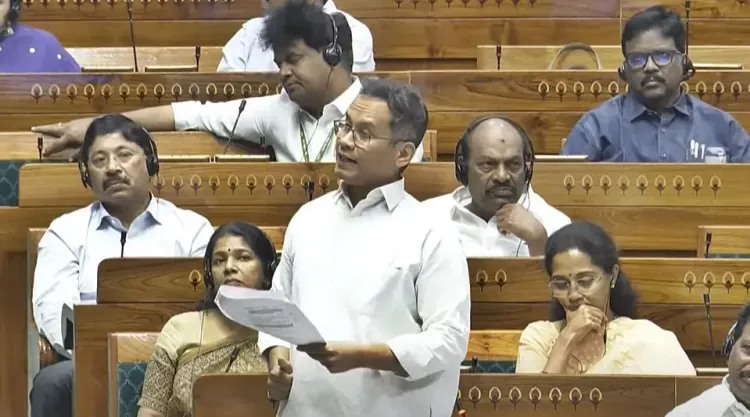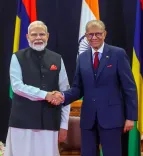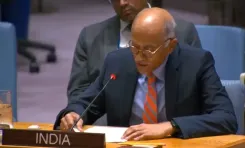Gaurav Gogoi: Waqf Bill Undermines Constitution and Divides Society

Synopsis
Key Takeaways
- Government's intentions scrutinized by Gaurav Gogoi.
- Concerns over amendments that could exacerbate issues.
- Accusation of spreading confusion and division.
- Waqf Board's authority undermined by proposed changes.
- Call for transparency in discussions about the Bill.
New Delhi, April 2 (NationPress) During the ongoing discussions in Parliament over the controversial Waqf Amendment Bill 2025 on Wednesday, Gaurav Gogoi, the deputy leader of the Opposition in the Lok Sabha, strongly criticized the government's intentions.
He articulated significant concerns regarding the government's motives, asserting, "Today, they are focusing on the land of a specific community; tomorrow, they may target the land of other minorities in our society."
While he recognized the necessity for amendments, Gogoi insisted that these changes should enhance the Bill rather than intensify issues and conflicts, which he maintained would be the outcome of the proposed modifications.
Gogoi accused the government of inciting disorder by permitting lawsuits to be filed nationally, thus disturbing the "environment of harmony."
He pointed out existing provisions that allow the Waqf Board to formulate regulations with the approval of the state government, which the proposed amendments aim to abolish. He contended that this action diminishes the authority of state governments, which currently have the power to enact rules, including those that benefit the survey commissioner.
"You intend to eliminate everything and call these changes amendments," he remarked.
The member criticized the government's plan that seemingly reduces the High Court's role following tribunal decisions. Gogoi clarified that the High Court maintains the power to review and amend decisions to rectify injustices. He also highlighted that the Centre already possesses the authority to issue directives to state boards, refuting claims that the existing law is deficient.
He accused the government of propagating falsehoods, particularly the assertion that the present law is prejudiced against women.
Gaurav Gogoi raised alarms about the secular essence of the nation, indicating that the government seemed to support a provision that would only allow individuals who have practiced Islam for five years to establish Waqf.
He contrasted this with the previous framework, which allowed anyone to create a Waqf, stressing that this inclusivity embodied India's secular nature. Gogoi also noted that the requirement for two women on the Waqf Board has always existed, including provisions for widows and divorcees.
He charged the government with disseminating misinformation by suggesting that the current Act is discriminatory towards women. Gogoi also condemned the reduction of Waqf revenue from 7 percent to 5 percent, questioning the government's dedication to ensuring the effective functioning and modernization of the Waqf Board and Tribunal. He suggested raising the revenue to 11 percent to guarantee their efficient operation.
Additionally, he expressed concerns about the government’s tactics, questioning whether they would require certificates from individuals of different religions to create Waqf.
He accused the government of intertwining religion with the issue, stating, "Why are they asking for evidence of one's faith? This Bill attacks the fundamental structure of the Constitution."
Gogoi dismissed the government's assertions of thorough discussions prior to the Bill's introduction as deceptive.
He demanded clarity on the five meetings held regarding the issue, maintaining that none of them indicated a requirement for a new Waqf Bill.
He questioned the origins of the Bill, given that the ministry had not contemplated it until 2023.
He concluded by alleging that the government has four aims through this Bill: to undermine the Constitution, propagate confusion, malign minorities, and fragment Indian society.
He characterized the Bill as an assault on the federal framework and the core principles of the Constitution. Referring to recent occurrences, he stated, "A few weeks ago, people celebrated Eid, yet their double-engine government barred them from offering Namaz (prayer) on the road."
Gogoi's address emphasized his party's pledge to the Constitution of India, which he described as the guiding principle in matters such as the Ayodhya Ram Temple and the Waqf Bill. He reaffirmed the Constitution's commitment to social, religious, and political justice and equality for all citizens.








